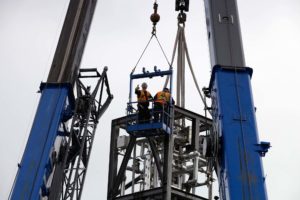Clean Energy Canada | Photo Essay: The Refinery of Tomorrow Rises in Quebec
June 2, 2015

Electric cars are a great option for zipping around town, but it would take a prohibitive number of batteries to power a heavier-duty rig such as a long-haul transport truck. To keep these cargo haulers rolling far into the low-carbon future, we’re going to need renewable liquid fuels—and lots of them.
Enter SÉMER, a state-of-the-art waste-to-energy plant and biomethane refinery now undergoing trials in Quebec. Next month, the facility will begin processing landfill gas and organic waste—including kitchen scraps and castoffs from slaughterhouses, water treatment plants, septic tanks, and agricultural livestock—to ultimately produce up to 3.6 million litres of liquid biomethane each year.
Quebec-based engineering firm Terix Envirogaz built and will operate SÉMER. The company will sell its liquefied biomethane to Gaz Métro, which will in turn retail the biomethane directly to truckers working the long-haul transport routes between Toronto and the Maritimes. The trucks must already have been converted to run on LNG. In doing so, Terix will reduce Quebec’s greenhouse gas emissions by about 9,000 tonnes per year.
SÉMER—a contraction of Société d’économie mixte d’énergie renouvelable de la région de Rivière-du-Loup— is a publicly funded partnership between Terix Envirogaz, the regional county municipality of Rivière-du-Loup, and the city of Rivière-du-Loup.
The plant is a product of Quebec’s 2006-2012 Climate Change Action Plan. The province and the federal government together financed the $25 million facility through initiatives designed to help local governments divert organic waste currently sent to landfills and make better use of the resource.
The SÉMER plant will not only produce renewable liquid fuel to reduce Quebec’s reliance on imported diesel and natural gas, but also nitrogen-rich liquid fertilizer that will slash local farmers dependence on imported fossil fuel-based chemical fertilizers.
Terix will officially inaugurate the facility in late summer 2015.